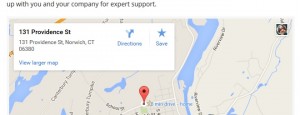 I don't know if you can see it but the embedded Google Maps widget on my company website has me logged in and knows the drive time to my home. Helpful when I'm using Google Maps on my smartphone but downright creepy and intrusive when I'm on a random website.
I don't know if you can see it but the embedded Google Maps widget on my company website has me logged in and knows the drive time to my home. Helpful when I'm using Google Maps on my smartphone but downright creepy and intrusive when I'm on a random website.
Now I know that others will disagree and tell me that this could be helpful when I'm visiting the site of a place or business I'd like to visit. The real issue however is am I that lazy that I need Google (or whoever) to do this kind of thinking for me?
Predictive analytics allow data to be mined to predict unknown and future events based on historical data. The data points collected can be used to make models etc. One of my friends recently commented that Siri® had suggested, when he left work, the drive time to the bar he usually hung out at after work on that weekday. He was amused and yet a bit bothered at the same time. Is this the kind of world we're moving into where the digital devices we interact with with learn our behavior and then make helpful suggestions and information? The Internet of Things or IoT is all the rage and the latest buzzword. Just the other day I was asked to fill out a survey asking whether or not we have a business plan in place to take advantage of and manage it.
Your smart thermostat and your smart electrical meter can reveal your sleep pattern and your electric utility knows when you're home. OnStar® and the like track your vehicle movement and can control certain functions as well which is why Fiat/Chrysler recalled their connected cars when a relatively easy hack showed that someone could control vehicle operation functions. I'm not trying to sound like a conspiracy theorist here and I'm not predicting the rise of the machines (while looking for evidence that Skynet has been developed) but what I am suggesting is that you be cognizant of when your information is being collected and shared especially if it's by you.
Facebook and Twitter logins can be used to access many sites and services. Google+ can too. When you stay signed into your browser or into your social media site or other web page or service be aware that you may be leaving a trail of breadcrumbs behind you.
Good rule(s) of thumb to avoid this?
- Delete your cookies (Adobe Flash ones too).
- Sign out before closing any webpage.
- Open a new tab after you've signed out before visiting and new site.
- Register for a login at the website you want to visit without using another company's login credentials to get you there. This way you control the amount of information you give them on their sign up form. They get to have access to your likes and friends lists and what groups you belong to or what you've tweeted, retweeted and favorited.
It's your personal information and data. Control who can access it and what and how much they get.



